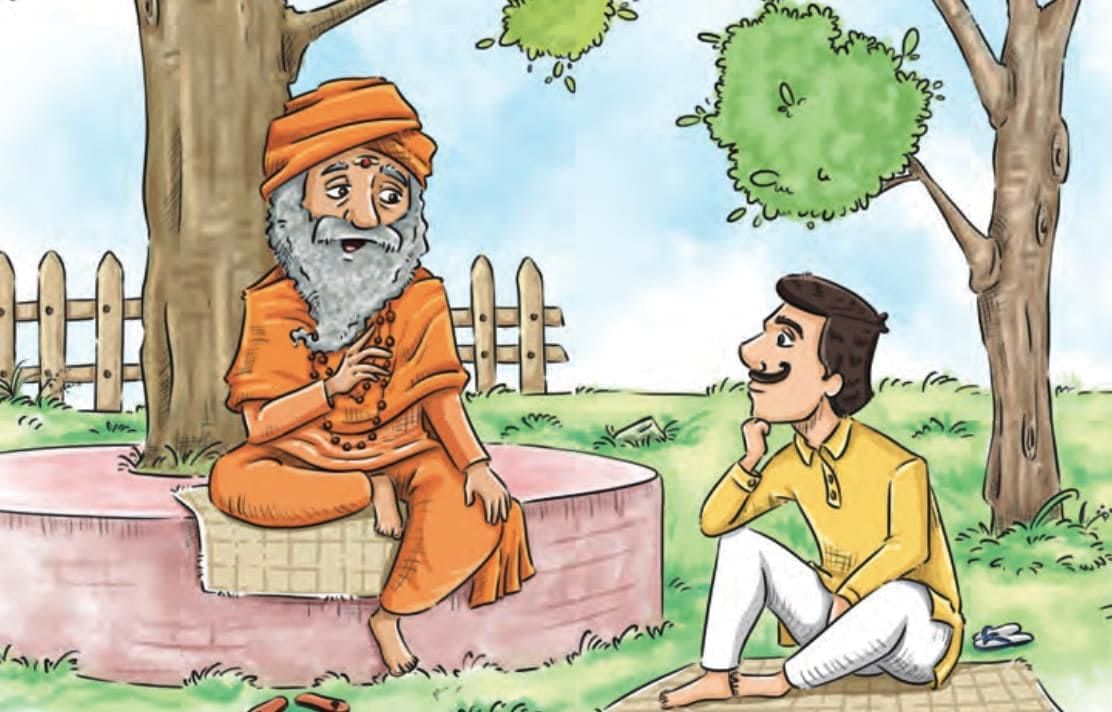Important Questions: A Bottle of Dew | English for Class 6 PDF Download
Q1: What was Rama Natha obsessed with finding?
a) A hidden treasure
b) A magic potion
c) A secret map
d) A rare plant
Answer: b
Q2: Who was Mahipati in the story?
a) A farmer
b) A sage
c) A merchant
d) A king
Answer: b
Q3: What did Rama Natha collect from banana trees for six years?
a) Fruits
b) Leaves
c) Dew
d) Bark
Answer: c
Q4: What was the main source of Rama Natha’s wealth in the end?
a) A magic spell
b) Hard work on the banana plantation
c) Gold coins from the sage
d) Selling his land
Answer: b
Q5: What is the meaning of the word “perseverance” in the story?
a) Laziness
b) Determination despite difficulties
c) Cheating others
d) Giving up easily
Answer: b
Q6: Why was Madhumati anxious about their future?
a) Because of a drought
b) Due to Rama Natha’s careless spending
c) Because of a war
d) Due to illness
Answer: b
Q7: What did Rama Natha sprinkle the dew on to test the potion?
a) A copper vessel
b) A gold coin
c) A banana leaf
d) A wooden box
Answer: a
Q8: What is the moral of the story?
a) Magic is real
b) Hard work leads to success
c) Wealth comes from luck
d) Shortcuts always work
Answer: b
Q9: How long did it take Rama Natha to collect five litres of dew?
a) One year
b) Three years
c) Six years
d) Ten years
Answer: c
Q10: What did the sage use to trick Rama Natha?
a) A fake map
b) A false promise of a magic potion
c) A hidden treasure
d) A secret book
Answer: b
Q11: What task did Sage Mahipati give Rama Natha to create the potion?
Answer: Sage Mahipati instructed Rama Natha to plant banana trees, care for them, and collect dew from their leaves during winter until he had five litres.
Q12: How did Madhumati help in their success?
Answer: Madhumati helped by supporting the banana farm and selling bananas in the market, which contributed to their financial recovery.
Q13: What lesson did the sage teach Rama Natha?
Answer: The sage taught Rama Natha that true wealth comes from hard work and effort, not from magical shortcuts.
Q14: Define the word “illusion” as used in the story, and give an example from the text.
Answer: Illusion means a false impression. In the story, Rama Natha’s belief in a magic potion was an illusion, as no such potion existed.
Q15: Why did Rama Natha neglect his inherited lands?
Answer: Rama Natha neglected his lands because he was obsessed with finding a magic potion that could turn anything into gold, spending his time and resources on this pursuit.
Q16: Describe how Rama Natha’s actions changed after he started following the sage’s advice, and what was the outcome?
Answer: After meeting Sage Mahipati, Rama Natha shifted from chasing a magic potion to working diligently. He cleared his neglected fields, planted banana trees, and cared for them personally, collecting dew from their leaves over six years. With Madhumati’s help in selling bananas, they built a successful plantation. When he presented the dew to the sage, he learned there was no magic potion; their wealth came from hard work. The outcome was financial stability through the banana farm and a realization that effort, not magic, brings success. Rama Natha committed to working harder, valuing the sage’s lesson.
Q17: Explain the theme and message of the story “The Magic Potion” with examples from the text.
Answer: The theme of the story is the importance of hard work, perseverance, and wisdom over seeking shortcuts. It highlights that success comes from effort, not magical solutions. For example, Rama Natha’s obsession with a potion led to wasted resources, but planting and tending banana trees for six years brought wealth. The message is that dedication and consistent effort lead to true rewards, as seen when the sage revealed that the gold coins came from selling bananas, not a potion. This teaches that shortcuts often disappoint, while hard work ensures lasting success.
Q18: Discuss the role of Madhumati in the story and how her actions contributed to the family’s success.
Answer: Madhumati played a crucial role as a supportive and practical partner to Rama Natha. While he was obsessed with the magic potion, she worried about their future due to his reckless spending. When Rama Natha followed the sage’s advice to plant banana trees, Madhumati actively contributed by helping with the farm and selling bananas in the market. Her efforts ensured a steady income, which accumulated into a box of gold coins, as revealed by the sage. Madhumati’s hard work and dedication complemented Rama Natha’s efforts, leading to their financial recovery and teaching him the value of collaborative effort in achieving success.
Q19: Why is the lesson of hard work important in life, and how can students apply it in their studies, inspired by Rama Natha’s story?
Answer: The lesson of hard work, as shown in Rama Natha’s story, is important because it teaches that success requires effort, patience, and perseverance, not shortcuts. Rama Natha’s wealth came from six years of tending banana trees, not a magic potion, showing that dedication brings real rewards. Students can apply this by studying consistently, completing assignments diligently, and preparing for exams over time rather than relying on last-minute cramming. For example, practicing math daily or reading regularly builds skills gradually, like Rama Natha’s plantation grew. This approach fosters discipline and ensures long-term academic success.
|
66 videos|499 docs|71 tests
|
FAQs on Important Questions: A Bottle of Dew - English for Class 6
| 1. What is the main theme of "A Bottle of Dew"? |  |
| 2. Who are the main characters in "A Bottle of Dew"? |  |
| 3. How does the bottle of dew symbolize childhood curiosity? |  |
| 4. What lessons can be learned from "A Bottle of Dew"? |  |
| 5. In what ways does the setting of "A Bottle of Dew" enhance the story? |  |




















